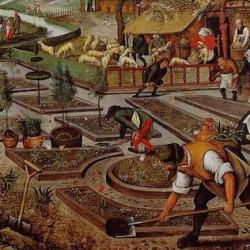“None of our Western [economic] distinctions was completely absent in antiquity,” writes Sitta van Reden near the end of her Exchange in Ancient Greece (218). Yet, because of a different configuration of society the distinctions we take for granted were not so ingrained:
“Rigid status boundaries between citizens and outsiders, free men and slaves and men and women made it impossible to think of humans as never the objects of exchange or property. The idea that agrarian produce was the gift of the gods given in exchange for toil and just also made it unnecessary to distinguish between production and exchange. The acquisition of valuables from nature (or the gods) and from other people were not distinguished categorically as long as the question of the distinction between nature and culture was unsettled. Since the boundaries between people and things, and nature and culture, were not drawn so clearly as in Western thought, the distinction between the value of objects and the value of people or personalised gifts shifted whenever the metaphysical definition of the human condition shifted.”
In particular, antiquity lacked a concept of the “individual” as it has developed later in Western thought: “in Greek thought . . . a person was either a member of a community or no person – that is simply a body. Any interest that he pursued not as a member of a community could thus be only understood as an interest of his body.” Thus, “self-interest did not refer to the interest of a ‘self’ independent of an ‘other,’ but to an interest that could be satisfied only either by others or at the cost of others.”














